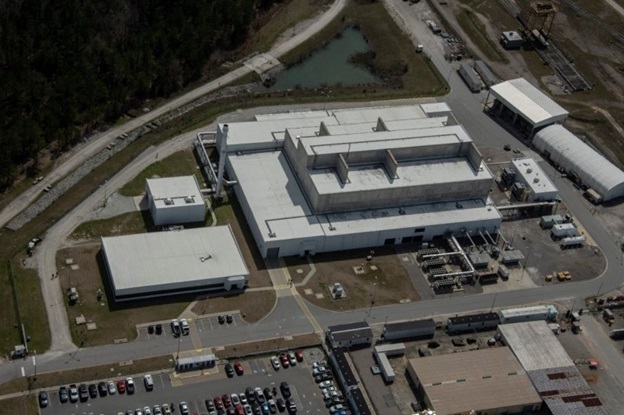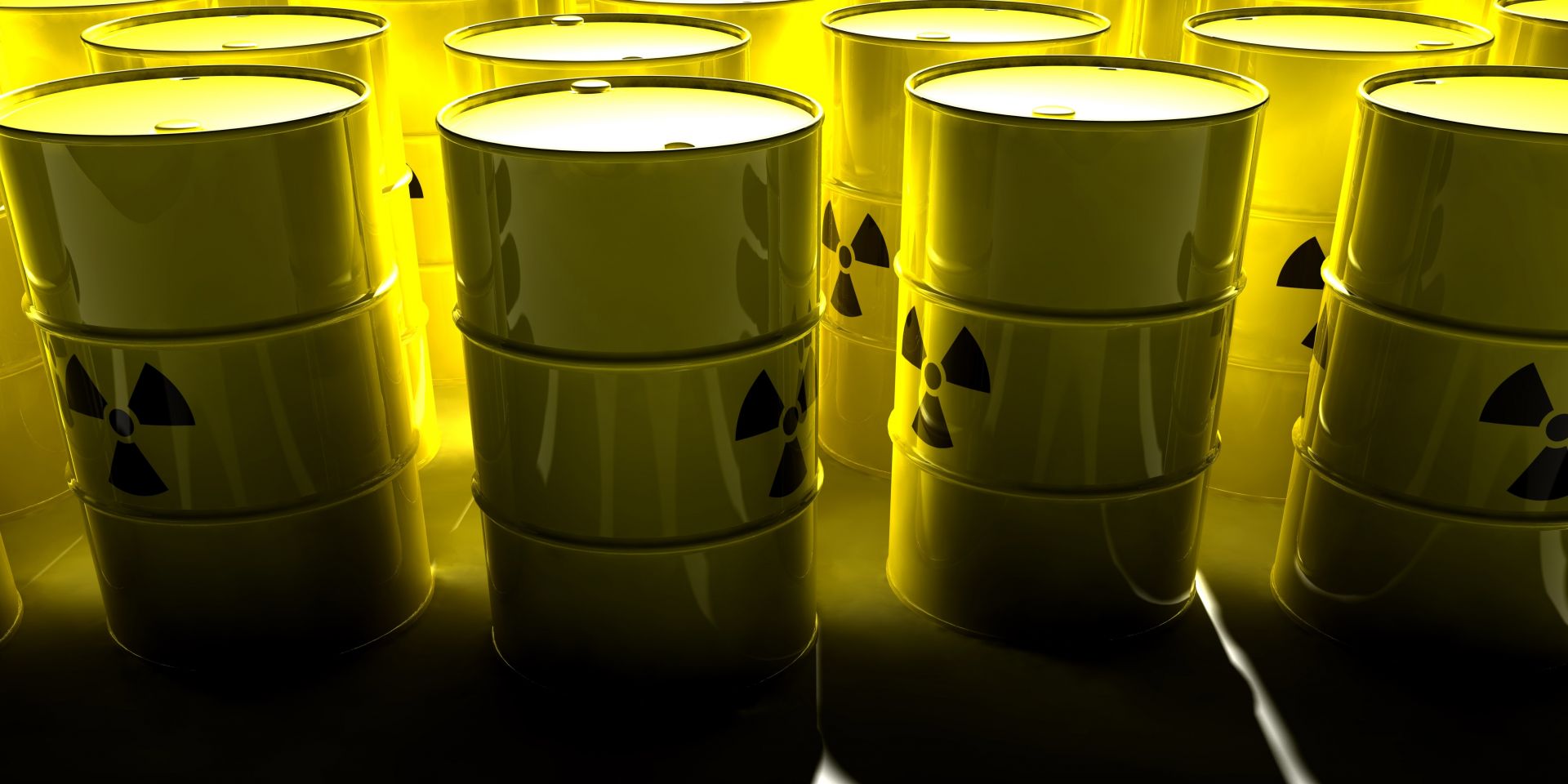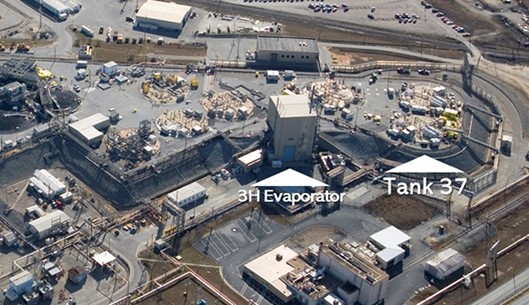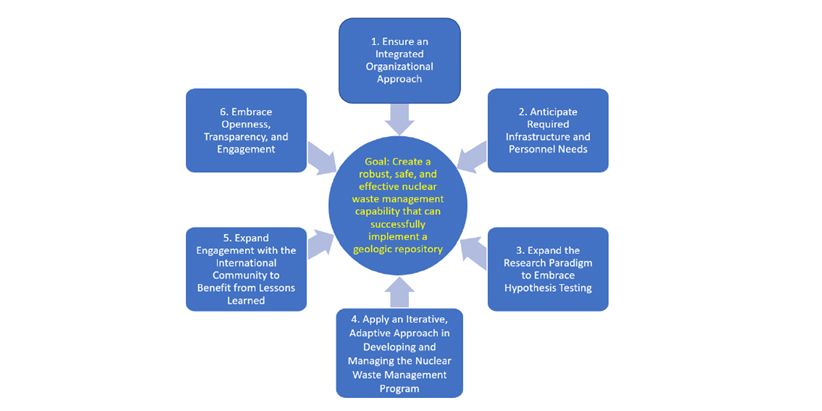The Chernobyl site in 2017 following the placement of the New Safe Confinement structure. (Photo: EBRD)
No matter the discipline, reporting on technical issues for a mass audience is fraught with pitfalls. To make the subject understandable to the layperson, authors make generous use of analogies, which are inherently incomplete and tenuous, like a stone house being built on swampland.
Likewise, in an effort to garner as many clicks or views as possible, reporters and news outlets will often resort to sensationalism, making the news being reported more dramatic than it is. (To be fair, those supplying the news can also be guilty of sensationalism in their hunger for media coverage.)
A view of the Savannah River Site’s Salt Waste Processing Facility. (Photo: DOE)
The Salt Waste Processing Facility at the Department of Energy’s Savannah River Site has performed largely as expected, processing more than one million gallons of radioactive waste during its first eight months of operation, the DOE reported on June 8. The SWPF is being used to treat the majority of the site’s remaining liquid radioactive waste, generated from the production of nuclear materials.
The Waste Isolation Pilot Plant in southeastern New Mexico.
The Department of Energy has issued a final request for proposals for a 10-year, $3 billion management and operating contract for the Waste Isolation Pilot Plant near Carlsbad, N.M. The current M&O contract, held by Nuclear Waste Partnership, expires on September 30.
A loaded waste container at the site of the former Plutonium Finishing Plant is surveyed to ensure that it is safe for transfer to Hanford’s on-site disposal facility. (Photo: DOE)
Final cleanup activities at the Hanford Site’s demolished Plutonium Finishing Plant have resumed following a pause in work prompted by the COVID-19 pandemic, the Department of Energy announced. Crews with the DOE’s Richland Operations Office and site contractor Central Plateau Cleanup Company will remove, package, and dispose of rubble remaining from the demolition of the plant’s plutonium reclamation facility, which was torn down in 2017.
A U.S. Navy Surface Ship Support Barge (the large vessel in photo), which is used to refuel nuclear-powered ships and dismantle spent fuel units, will be scrapped in a three-year process. (Photo: Stripes.com)
Towed from its home in Newport News, Va., the U.S. Navy’s Surface Ship Support Barge has arrived in Mobile, Ala., for decommissioning, Advance Local Alabama reported on June 1. The 268-foot-long barge operated from 1964 to 2016, supporting the Navy's nuclear vessel refueling and functioning like a spent fuel pool at a commercial nuclear power plant.
The new sign at the Indian Point Energy Center. (Photo: Holtec)
The transfer of the Indian Point nuclear power plant from Entergy to Holtec International and its subsidiaries was completed last week. Under the asset transfer deal, Holtec Indian Point becomes owner of the closed plant, with Holtec Decommissioning International serving as the site’s license holder and decommissioning operator.
The Snake River Plain Aquifer
The Department of Energy’s Office of Environmental Management will award the Idaho Cleanup Project contract for the Idaho National Laboratory site to Idaho Environmental Coalition (IEC), of Tullahoma, Tenn. The contract has an estimated ceiling of approximately $6.4 billion over 10 years, with cost reimbursement and fixed-price task orders to define the contract performance.
Work crews prepare to place the final waste shipment into a vault at the Subsurface Disposal Area at the Idaho National Laboratory site. (Photo: DOE)
Using Framatome’s technology, Germany’s VIRERO project is developing a robotic system for sorting and packaging radioactive waste. (Photo: Framatome)
Paving the way for increased automation in nuclear decontamination and decommissioning and waste management, French nuclear company Framatome announced that testing has confirmed the operation of its robotic systems for handling and sorting high-dose waste components.
Canada’s pickering nuclear power plant. (photo: opg)
A collaboration agreement signed by Ontario Power Generation’s Center for Canadian Nuclear Sustainability, Canadian Nuclear Laboratories, and SNC-Lavalin will build on Ontario’s extensive nuclear industry expertise and skilled workforce to support the decommissioning of CANDU reactors in Canada and around the world, according to a May 13 press release from the organizations. The work will include the decommissioning of OPG’s Pickering nuclear power plant following the end of commercial operations in 2025.
A salt dissolution campaign in Tank 37 at the Savannah River Site was completed ahead of schedule, creating tank space for evaporator operations and allowing for more feed to the Salt Waste Processing Facility. (Photo: DOE)
Department of Energy contractor Savannah River Remediation (SRR) announced on May 11 that it has completed a salt dissolution campaign in Tank 37, one of the underground tanks storing high-level radioactive liquid waste at the Savannah River Site (SRS) in South Carolina.
EnergySolutions will acquire Kewaunee for decommissioning. Photo: Dominion Generation
Utah-based EnergySolutions has entered into a definitive agreement with Dominion Energy to acquire the closed Kewaunee nuclear power plant for prompt decommissioning. Located about 30 miles southeast of Green Bay, Wis., the single-unit, 574-MWe pressurized water reactor was shut down in May 2013 for financial reasons.
A deposition tunnel is excavated into bedrock at Finland’s Onkalo facility. (Photo: Posiva)
Posiva Oy, the company responsible for the disposal of Finland’s spent nuclear fuel, announced last week that it has begun excavating the first disposal tunnels at the Onkalo deep geologic repository near the Olkiluoto nuclear power plant.
The closed Vermont Yankee power plant is currently undergoing decommissioning. (Photo: Entergy)
The Nuclear Regulatory Commission is set to allow about 2 million gallons of low-level radioactive wastewater from the Vermont Yankee nuclear power plant, currently undergoing decommissioning, to be disposed of at an Idaho waste facility. As published in the May 7 Federal Register, the NRC has issued an environmental assessment and finding of no significant impact for a request by NorthStar Nuclear Decommissioning to dispose of the wastewater at US Ecology Idaho’s waste facility near Grand View.
Ray Geimer with DOE contractor Central Plateau Cleanup Company, left, shows company president Scott Sax a mock-up of parts of a vertical pipe casing system at Hanford’s Maintenance and Storage Facility. Photo: DOE
Workers at the Department of Energy’s Hanford Site near Richland, Wash., recently completed testing a mock-up of a system that will be used to isolate and stabilize about 15,000 pounds of radioactive debris in the site’s K West Reactor spent fuel storage basin.
The NWTRB’s six overarching recommendations for the DOE’s nuclear waste management program.
The B Complex area tank farm at the DOE’s Hanford Site in Washington. Photo: DOE
The Department of Energy announced that it has determined that an underground single-shell waste tank at its Hanford Site near Richland, Wash., is likely leaking into the soil beneath the tank. The DOE said that the leaking tank poses no increased health or safety risk to the Hanford workforce or the public.



















